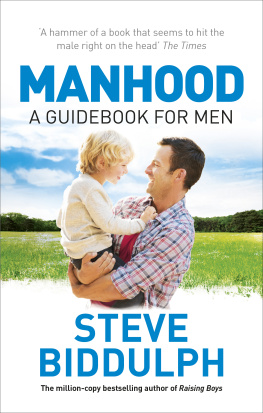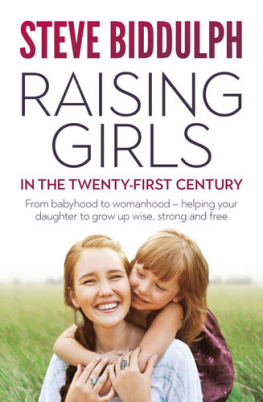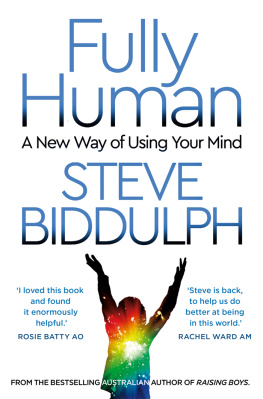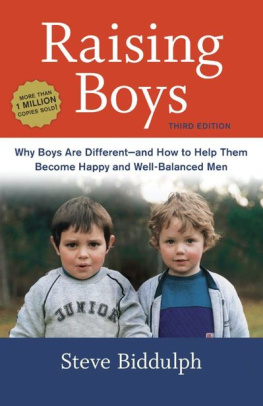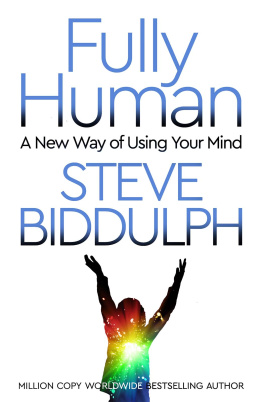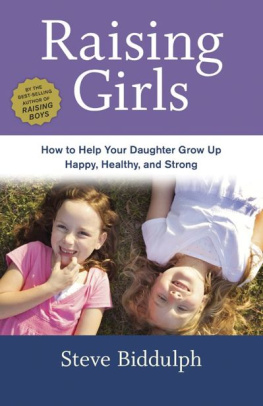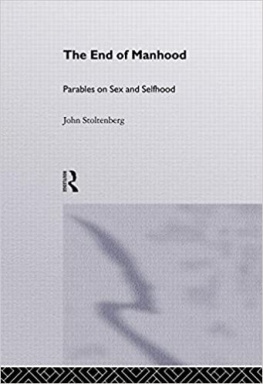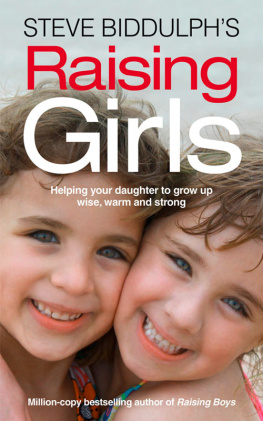Contents
About the Author
Steve Biddulph has been a psychologist for thirty years. He was one of the pioneers of family therapy in Australia, working with struggling families in the industrial city of Launceston, where he recognised that there was a need for books that were humorous, easy to read and matched the needs of young parents without much time or energy at the end of a busy day.
His first book The Secret of Happy Children certainly filled this niche, reaching over a million parents in 27 languages; it has been in print for 20 years. Steve has also worked with sexual assault victims, Vietnam Veterans, the police, emergency services and, for eight years, directed the Collinsvale Centre, which taught medical professionals to use counselling skills and understand peoples feelings as well as their bodies.
In 1994 he released Raising Boys a number one bestseller in countries as diverse as New Zealand and Brazil. Raising Boys broke the logjam of thinking about nature or nurture, detailing how by working with nature boys physical and hormonal differences we could then nurture them into caring, safe, exuberant and focused young men.
Biddulph was voted Father of the Year in Australia for his contribution to encouraging fathers to engage with their children. He visits the UK, Germany, Japan, New Zealand and Korea regularly to work with parents and also in encouraging school systems to be more boy-friendly. All proceeds from Steves talks and seminars are used to improve Australias treatment of refugee children and their parents and for the care of refugee families across the globe.
Permissions
Grateful acknowledgement is made to the following people and organisations for permission to include their material in this book.
All quoted matter by Robert Bly in this book, unles otherwise stated, is taken from his book, Iron John. This material is reproduced with the kind permission of the publishers, Element Books of Shaftesbury, Dorset, UK.
Male Bashing, which first appeared in To Be A Man, K. Thompson (editor), is reproduced with the kind permission of the author, Fredric Hayward, MR Inc., PO Box 163180, Sacramento, California 95816, USA.
The interview with Charles Perkins is extracted from The Return to the Dreamtime, with the permission of the author, Mr Stuart Rintoul, and the Australian newspaper.
The cartoon, Trouble at the Im OK, Youre OK Corral, is reprinted with kind permission of The Cartoonist Limited, London. The cartoon, The Demon, is reprinted from A Bunch of Poesy, by Michael Leunig, with the kind permission of Collins/Angus & Robertson Publishers, a division of HarperCollins Publishers Australia.
Sources for brief quotations are given in the bibliography. Where other quotations have been used, every reasonable effort has been made to seek permission and include full accreditation of the source prior to publication.
Foreword to the UK Edition
Im standing backstage at Melbournes Concert Hall, and my heart is threatening to beat right out of my chest. I dont usually get stage fright before a talk, but sometimes it just hits me out of the blue, so I use a tried and true remedy I go and chat with some of the audience waiting in the lobby. This nearly always works because it reassures my inner child that they are a friendly bunch, eager to have a good time.
Ive been out in the lobby for just a few minutes when I notice a big, bearded, tattooed man in a denim shirt with the sleeves torn off standing not far away. Hes noticed me too, and he beckons to two other men he is with. The three of them begin to move across and in a moment he is right there, his head tilted back and a frown on his face.
You been following me around?
My mouth opens and shuts wordlessly, but I am thinking, Help!
He doesnt let me suffer long. His face breaks into a wide grin. That bloody book of yours thats the story of my bloody life, mate. I grin too, as I slowly work it out, and soon he is introducing his father and brother. He explains, while they silently nod in agreement, that the three of them had been estranged for years until he had read this book Manhood, and passed it on to the other two, and they had sorted things out between them. They had come along together to say thanks in person and see what else I had to say.
For a family psychologist, job satisfaction doesnt come much better than this, and yet its a recurring message. A week or two earlier I had heard something very similar from one of Australias few truly philanthropic billionaires, so it had nothing to do with class or education. Manhood was doing what I hoped giving men a tool they could use to break out of their isolation and outdated macho roles. The idea was catching on: you could be a real man and still be warm, open and live a free and exuberant life. There was more to life as a man than just being a walking wallet.
Manhood was first published in Australia, then Germany, and was read by half a million people across Australasia, the UK and Western Europe in its first year of release. The USA had Iron John by Robert Bly and Fire in the Belly by Sam Keen, both excellent books, but Manhood spoke more to regular, hard-headed men, and looked to more earthy and lasting changes. What Manhood said was that there is more to life as a man than lonely struggle, earning and spending, being a cog in an industrial society you dont even like. It also said that mens conditioning in family, school and popular culture was seriously handicapping us and it was time for a change. (Remember, there was something called Womens Liberation that did just this for women, with remarkable success, several decades ago so it was not impossible.)
The book was part of a broader discussion just starting to break out. Hundreds of magazine articles, newspaper columns, radio debates and thousands of conversations were taking place about the possibility of men changing, not (like good little boys) because they should (a famously unsuccessful formula for change) but because they were beginning to find that they could and wanted to. Movies such as The Full Monty and About a Boy were addressing the question of masculine choice, and even the hit TV show Seachange had a mens group. Awkwardly, hesitantly, something was starting to change.
Womens liberation, for all its successes, has not been enough to bring the needed changes. There are bigger issues than who does the housework or who is the chair of HSBC. We are still a civilisation going to hell in a handbasket of materialistic greed. Our current almost hysterical obsession with terrorism seems rather ingenuous, given that our relationship with the undeveloped world is almost entirely one of theft. Fair trade, debt reduction, no longer propping up vicious regimes because they are someone we can do business with are the only real solutions to the eternal risk of terrorism. The danger to our childrens children is not terror, but corporate globalised waste and consumption, driven by the unhappiness of Western men, and women too. We have to change ourselves fundamentally if the world is going to work. Everything is connected. How you make a living, what you consume, how you spend your time the questions of mens liberation will determine the future of the globe.
There is great confusion right now about where we are going. Social trends swirl about, like the currents at the change of the tide. Yet its always like this when a significant change is beginning. Its getting better even as its getting worse. While some men work 60-hour weeks, others are quitting their jobs or cutting their hours to have time to love their children. While some men think money is God, others are simplifying and walking away from wealth, choosing freedom of time to be creative or involved in their community. While some men are drowning their sadness in drugs, drink and promiscuity, others are rediscovering the joy of intimate sex, friendliness and compassion in their relationships with women. Men are starting to change.
Next page
